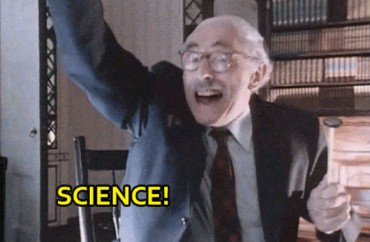
Opinion about rubber-stamp investigation is not protected
We’ve covered Penn State climate scientist Michael Mann’s defamation lawsuit against his critics at National Review and the Competitive Enterprise Institute – a widely understood threat to journalism – for a couple years now. (It even spilled over into an unrelated dispute involving George Will.)
It looks like our coverage won’t end anytime soon.
This morning the D.C. Court of Appeals (not to be confused with the federal appeals court in D.C.) let Mann’s case proceed on the theory that because Penn State cleared him of “scientific misconduct” in his controversial “hockey-stick” climate research, no one is allowed to criticize his work.
Case Western University School of Law Prof. Jonathan Adler writes at The Washington Post that “Donald Trump has not even been sworn in yet, and it’s already becoming easier for public figures to sue people in the nation’s capital” and “chill robust political debate.”
MORE: News outlets line up against climate science prof for suing critics
The ruling basically says once an investigation has concluded – one whose findings you may not find persuasive for good reasons – you cannot continue accusing someone of wrongdoing, even while clearly stating that you are only expressing your opinion, according to Adler’s reading:
Given that Mann is a public figure for the purposes of this litigation, under D.C.’s anti-SLAPP law, he could only prevail if the court could conclude there was a reasonable likelihood that a reasonable jury could find, by “clear and convincing evidence” that [writers Mark] Steyn and [Rand] Simberg acted with “actual malice” or a “reckless disregard” of the truth or falsity of the claims at issue. …
While a direct accusation of scientific fraud may be actionable — particularly when made against a non-public figure — challenges to scientific conclusions and interpretations of scientific studies are clearly protected by the First Amendment. So are erroneous interpretations of scientific conclusions and — particularly relevant here — criticisms of the conclusions of investigatory bodies.
Simberg had accused Mann of “molesting” his climate data like convicted Penn State assistant football coach Jerry Sandusky had molested children – and Penn State of covering it up. Steyn had said Simberg “has a point. … If an institution is prepared to cover up systemic statutory rape of minors, what won’t it cover up?”
MORE: Think tanks argue Michael Mann can’t muzzle critics in court
So the pertinent criticism is against the investigations by Penn State and others. Nobody is calling Mann an actual molester, and they are arguing with how he reached his conclusions and claiming Penn State did a rubber-stamp review.
You can’t criticize an investigation, apparently:
Both Simberg and Steyn believe that Penn State failed to conduct a thorough investigation of the allegations against Mann and that other investigations either did not focus on Mann’s conduct or relied too heavily on Penn State. They were explicit on this point, and they cited the reasons for their conclusions. Further, a reader of their posts would be well aware that they were expressing their own opinions and not claiming that some independent investigatory body or tribunal had reached an equivalent judgment.
Because the university and other investigations failed to find evidence of scientific misconduct on Mann’s part, the court declared that claims Mann engaged in such action were “definitively discredited.”
This is a ludicrous result that would let public figures shut up people who continue to criticize them after any investigation has concluded, Adler says:
By this standard it would be defamatory to express the opinion that George Zimmerman or Darren Wilson is a murderer, even if one also argued that the reason either was exonerated was because of structural racism in the criminal-justice system.
The ruling got a couple things right, he says, dismissing Mann’s “intentional infliction of emotional distress claims” (science is apparently reserved for snowflakes?) and claims against National Review “for a subsequent editorial on the controversy.”
Read the ruling (warning: 111 pages) and Adler’s analysis.
MORE: You can’t invite George Will to speak because Michael Mann doesn’t like him
Like The College Fix on Facebook / Follow us on Twitter





Please join the conversation about our stories on Facebook, Twitter, Instagram, Reddit, MeWe, Rumble, Gab, Minds and Gettr.